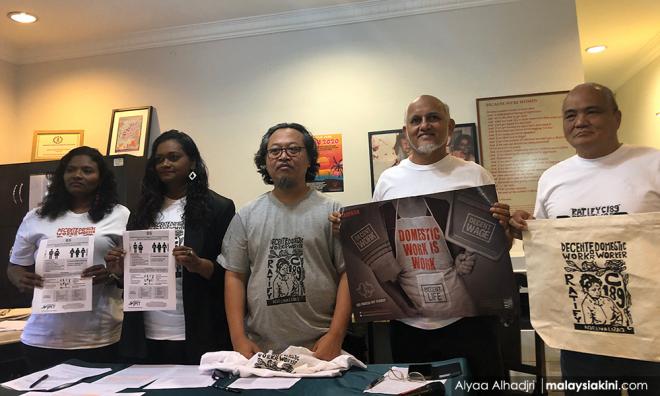
In conjunction with the International Migrants Day tomorrow, Tenaganita has reiterated its call for recognition of domestic workers under Malaysian labour laws and for them to be paid the minimum wage.
Without due recognition under the Employment Act 1955 by changing the current reference from "domestic servant" to "domestic workers", the migrant rights group said these women will continue to be denied their rights to minimum wage and other protections.
In cases where claims for unpaid wages were brought to the Labour Court, Tenaganita executive director Glorene Das said their applications would be filed based on calculations made using the minimum wage as a base.
"But the Labour Department argued that they (domestic workers) were never paid a minimum wage," she said during a press conference at Tenaganita's headquarters in Petaling Jaya today.
Through their years of experience in handling such cases, Das (below) said the problem was not limited to undocumented migrants employed through dubious means but also domestic workers with valid work permits which must be renewed annually throughout their term of employment.
"This means their employers have to go to the Immigration Department every year to renew their permits and their permits are renewed without checking that their wages have been paid," she explained.

She added that Tenaganita was currently handling two such ongoing cases, with one claim being filed for over RM250,000 in unpaid wages involving seven years of serving double duties both as a domestic worker plus a general worker at a business premise owned by the employer.
"How is it possible for domestic workers with work permits to be unpaid for months and even years?
"How is it possible for them to be subjected to horrific abuses for months on end resulting in severe injuries and even death?" she questioned.
Throughout this year, Das revealed that Tenaganita had received 77 new cases involving domestic workers.
Tenaganita project manager Fajar Santoadi said as domestic helpers were currently excluded from the Minimum Wages Order - since its inception in 2012 up to the latest amendments last year - any negotiation to claim unpaid wages would have to be based on their employment contract.
"The amount in the contract is usually lower than the minimum wage," he said.

Fajar (above) noted that the Indonesian Embassy in Kuala Lumpur had set a guideline for a domestic helper's salary rate although it still falls below Malaysia's national minimum wage.
"And that, too, is just a guideline and not a law which must be enforced," he pointed out.
In comparison, it is understood that a Filipino domestic helper must be paid a few hundred ringgit more as their minimum rate was set based on a US$400 figure.
Meanwhile, both Das and Fajar said Tenaganita remained in the dark on the progress in drafting a new Domestic Workers Act as first indicated by Human Resources Minister M Kulasegaran in April as part of larger reforms to a list of labour laws.
Das said at present, it remains unclear as to when the new act will be tabled in Parliament and whether the government will consider amending the status of domestic helpers under the Employment Act. - Mkini


No comments:
Post a Comment
Note: Only a member of this blog may post a comment.